
Former Amazon Labor Union President Chris Smalls joins us for one of his first interviews since he returned to the United States after he was beaten, arrested and detained by the Israeli military for attempting to bring aid to starving Palestinians in Gaza. Smalls calls Israel’s assault and starvation of Gaza a “working-class issue,” and was the only Black member of the Freedom Flotilla Coalition’s latest attempt to break Israel’s near-total blockade of Gaza. He describes his assault by Israeli soldiers, who “attacked me out of the 21 volunteers because of the color of my skin.” Smalls was later one of the last to be released from Israel’s Givon Prison, where he contracted scabies. “I can tell you right now, from my own experience, that Palestinians and people of color are not safe amongst the Israeli government,” he says.
Transcript
AMY GOODMAN: This is Democracy Now!, democracynow.org. I’m Amy Goodman, with Juan González, as we turn to Amazon Labor Union leader Chris Smalls, who was released from an Israeli prison and returned to the U.S. last week after at least five days in Israeli custody. He was one of 21 activists with the Freedom Flotilla Coalition who attempted to break Israel’s blockade on Gaza by sailing a civilian aid ship, named the Handala, with baby formula, diapers, food, medicine on board, the second time in less than two months Israeli forces raided a civilian humanitarian aid ship bound for Gaza as Palestinians face starvation in what U.N. experts have called a, quote, “worst-case scenario of famine,” unquote. Chris Smalls’ detention spurred international outrage, as he described being beaten by Israeli soldiers. He says they choked and kicked him, leaving visible marks on his neck and back. He’s the only Black activist aboard the Handala. He’s joining us now from New Jersey.
We welcome you, Chris, back to the United States and on —
CHRIS SMALLS: Thank you.
AMY GOODMAN: — to Democracy Now!
CHRIS SMALLS: Thank you. Thank you.
AMY GOODMAN: Can you explain what happened, your eyewitness account of when the Israeli special forces came on board your ship, and then what happened to you?
CHRIS SMALLS: Yes. Thank you for having me.
And what happened was, before they board the ship, you know, they cut communications first. That’s the first thing they do. You know, we were able to live-stream up until the point of interception. And what they do is they don’t want the world to see, so they definitely come during the sunset, after the sunset. They come in the middle of the night, just like they did with the Madleen. They cut communications first. Then they board the ship. They announce themselves. And then they want to pretty much commandeer the ship, make sure they have full control, so they ordered all of us to stay on deck with our hands up. We weren’t able to move. And as they take over the ship, they pretty much kidnap us and take us against our will to the Port of Ashdod in Israel, where that wasn’t our intention. Our intention was to go to Gaza and deliver humanitarian aid. So, for about 12 hours, we had to sail with the IOF to make sure that we transferred to the port authorities and the immigration department.
JUAN GONZÁLEZ: And, Chris, you’re known largely for your pioneering work as a labor organizer in winning the unionization drive at an Amazon plant. What made you decide to participate in the Freedom Flotilla?
CHRIS SMALLS: Well, first of all, U.S. labor unions in America have been very complicit, if not participated, in this genocide. For the last 21 months, U.S. labor unions have been shipping arms to Israel every 15 hours. I’ve publicly called them out. The longshoremen has blood on their hands, and the AFL-CIO has blood on their hands, as well. They have passed zero resolutions since October 7, and half a million Palestinians are dead because of this. And as a U.S. labor leader and a U.S. taxpaying citizen, the Palestinian movement and liberation and resistance always included trade unions, since the first Nakba.
So, from my journeys around the world and meeting with different trade unions, especially in the Middle East, I met plenty of Palestinian trade union presidents throughout the journey, and I understand that this is not outside the scope of labor. This is a working-class issue. And as a labor leader, it is our responsibility to be the shield of the working class. An injury to one is an injury to all, and that doesn’t exclude Palestinians.
AMY GOODMAN: Chris, we only have a minute. What happened to you in Israeli custody? And do you feel you were singled out?
CHRIS SMALLS: Well, absolutely. I mean, there’s no doubt about it. It had everything to do with racism and bigotry. I can tell you right now, from my own experience, that Palestinians and people of color are not safe amongst the Israeli government. They single-handedly attacked me, out of the 21 volunteers, because of the color of my skin. I didn’t want to consent to their propaganda, so seven authorities threw me to the ground. They put their knees in my back. They twisted my arms behind my back. They levitated me with three on each side, and one of them were pulling my hair back and choking my — choking me by the chains, telling me to shut up repeatedly. And they said some very racist remarks. They kept me isolated from the rest of the crew the entire time. And I know, once again, it was discrimination, and I wasn’t treated like any of the other passengers.
AMY GOODMAN: Did you get food, water? Also, we had wanted to have you in studio, but you said you couldn’t because you contracted scabies.
CHRIS SMALLS: Yeah, absolutely. I mean, I’m sorry I couldn’t be there in person. But we were on a hunger strike, so we absolutely did not eat any food. We remained in hunger strike from the moment of captivity up until our release. So, we were on 24-hour lockdown. We were punished because we were on a hunger strike. We wasn’t playing into the propaganda of what they tried to do with the Madleen with Greta, with the sandwiches and water. We refused everything that was given to us.
The prison conditions were horrible. And because of that, yes, I contracted scabies. And, you know, a number of us had to suffer some — had to get medical treatment after being released, because that wasn’t the only one or only thing that happened while we were in these inhumane conditions.
AMY GOODMAN: Chris Smalls, we want to thank you for being with us, founder of Amazon’s first U.S. labor union, participated in the Gaza aid ship named the Handala, which was carrying baby formula, diapers, food and medicine to try to break the Israeli siege on Gaza.
When we come back, showdown in Texas. More than 50 Democratic state lawmakers have fled Texas in order to block a vote on a newly drawn Texas map that could add five Republican congressional seats. Stay with us.
[break]
AMY GOODMAN: “Do You Believe in Rapture?” by Thurston Moore, performing at Smith College in 2005.

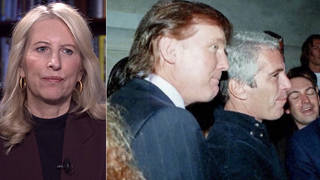
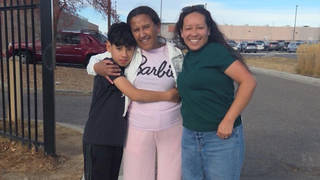
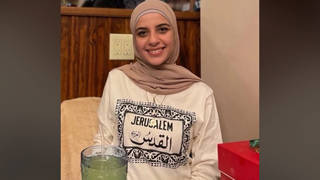
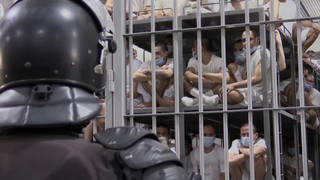
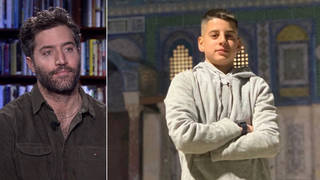




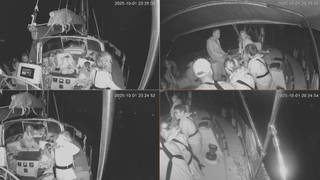

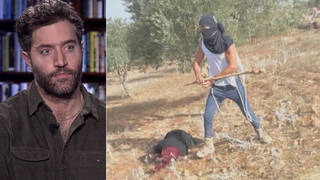
Media Options